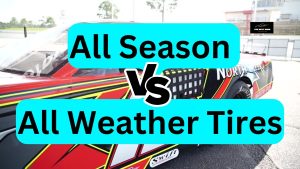Are you confused about all season tires vs all weather tires? In this article you Find out which one suits your driving needs better and hit the road confidently.
Are you feeling overtaken by the number of tires accessible to your vehicle? Many drivers are confused by the ongoing discussion over which tires were better- all-season nor all-weather. Let’s dispel the doubt and discuss the variations between these two tire kinds.
All Season Tires VS All Weather Tires: A Detailed Comparison
All-Season Tires
1. Design: All-season tires are designed to be versatile. It’s provide dependable performance in a variety of weather conditions, including light snowfall, damp surfaces and dry roadways.
2. Tread Design: Their balanced tread depth and unique patterns ensure effective grip across diverse landscapes.
3. Temperature Adaptability: These tires are suitable for both warm and cooler temperatures but are not designed for extreme winter conditions.
4. Ideal For: Drivers seeking convenience throughout the year, especially those residing in regions with moderate winters or minimal snow, will find all-season tires an optimal choice.
All-Weather Tires
Design: All-season tires can handle tough weather like snow, ice, slush, or rain.
Tread Pattern: They have strong tread patterns and siping to grip better on slippery surfaces.
Temperature Range: These tires work well in many temperatures because they stay flexible and grippy.
Application: They are good for cars in places with changing weather or occasional snow, where you might not need special winter tires.
Related: Yokohama Tires VS Michelin: Which is the Better?
All season vs all weather tires pros and cons

All season tires pros and cons
Pros
- Versatile in dry, wet, and light snow conditions.
- Cost-effective; no need for seasonal tire changes.
- Convenient, saving time on tire changes.
- Longer tread life than seasonal tires.
- Designed for comfortable driving.
Cons
- Not optimal in severe winter conditions.
- Performance is a compromise, not specialized.
- May have wet traction shortcomings.
All weather tires pros and cons
Pros
- Versatile in various conditions: dry, wet, light snow.
- Eliminates seasonal tire changes, saving time.
- Cost-effective by reducing need for multiple sets.
- Provides year-round safety with consistent performance.
- Promotes sustainability by reducing tire waste.
Cons
- Compromise in extreme weather performance
- Faster wear due to year-round use
- Less effective in severe winter conditions
- Not suitable for high-performance vehicles
- Long-term costs may be higher
Price differences
When exploring the distinctions between all-season and all-weather tires, one cannot help but notice the intriguing dance of price differences that often sway consumers’ decisions. It’s a nuanced melody where understanding the rhythm can save you both headaches and hard-earned dollars in the long term.
The initial cost of all-weather tires might evoke a bit of sticker shock compared to their all-season counterparts; this, however, is merely the surface of a deeper financial narrative.
Key Differences
1. Winter Performance: While all-weather tires provide superior traction on snow and ice. Other hand, all-season tires may not perform as well in extreme winter weather.
2. Tread Design: All-weather tires prioritize winter performance featuring improved grip qualities. Other hand, all-season tires have a more balanced design for pleasant driving throughout the year.
3. Temperature Range: In extremely cold temperatures, all-season tires perform worse than all-weather tires. Mild temperature fluctuations nevertheless cause it to perform efficiently.
4. Snowflake sign: The Three-Peak Mountain Snowflake sign is typically used to identify all-weather tires from all-season tires.
5. Regional Considerations: All-season tires may be adequate for drivers in areas without milder winters with occasional snowfall. All while all-weather tires may be more useful for individuals who live in more severe environments due to their improved winter performance.
What tire perfect for your vehicle “All season or all weather tires?”
The perfect tire for your vehicle depends on your climate and driving needs: choose all-season tires for mild conditions with little to no snow, and opt for all-weather tires if you face moderate to severe winter weather but want to avoid changing between summer and winter tires.
Conclusion
All season tires vs all weather tires, in the sort of tires you need for winter driving, your environment, and your driving style will all play a role in your decision. All-season tires might be adequate if your driving is mostly done in metropolitan locations with fast snow removal, or if your winters are mild. Nevertheless, if you frequently experience heavy snowfall or slippery roads, using all-weather tires can improve performance and safety in the winter.
We appreciate your presence and kindly invite you to spread the word about our article.
The Next Road (thenextroad.com) is an affiliate of the Amazon Services LLC Associates Program, so you can access the Amazon marketplace when on this domain. We will earn a commission from your qualified purchases.